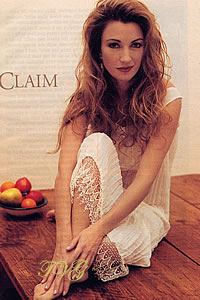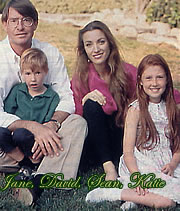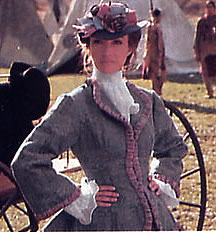 Jane
Seymour is livid. The star of 'TV's newest hit, Dr. Quinn,
Medicine Woman who seconds ago seemed cool and collected-is
now animated and edgy. "I'm upset-no, appalled by
it," she says. "Yeah. I am appalled by it."
Jane
Seymour is livid. The star of 'TV's newest hit, Dr. Quinn,
Medicine Woman who seconds ago seemed cool and collected-is
now animated and edgy. "I'm upset-no, appalled by
it," she says. "Yeah. I am appalled by it."
"It" is the sensational publicity surrounding Seymour's recent, messy
divorce, the one that ended her 10-year storybook marriage to Hollywood business
manager David Flynn. "It" is happening to Seymour, the likable queen
of the miniseries, who rekindled TV on Saturday nights with a wholesome "family
series" for CBS.
But the London papers have been blunt in their coverage of Seymour's
woes. One even reprinted "Jane's Letter of Pain," her note
to David that was almost agonizing to read. ("It kills me to see
the children tormented now," it read in part. "This all kills
me, but I'm strong and I will survive because that's what I do."
She confessed in one newspaper of sleeping with a young actor after
being "abandoned" by her husband. Another story featured
Jane discovering a picture of her husband with two nude women. The
stories about Jane are strikingly vivid: one account even had her,
in a fit of rage, "plunging a ballpoint pen into David's face,
just missing an eye."
 Did
that really happen? "Absolutely not," she says
hotly. "Ask David." I did-and indeed, he confirmed
her account that the incident never happened. According to
Jane, Flynn is still an important presence in the lives of
the children. too.
Did
that really happen? "Absolutely not," she says
hotly. "Ask David." I did-and indeed, he confirmed
her account that the incident never happened. According to
Jane, Flynn is still an important presence in the lives of
the children. too.
How did all of these details become so public? Most of Seymour's bad
press stems from revelations made by a writer , named George Mendoza. "I
met George on the Virgin Airlines inaugural flight," ; she says,
speaking of this incident for the first time. "I thought he was
a respectable writer; we agreed to try to publish a book together.
After we met, he kept at me with one book idea after another. Eventually
he stirred some interest from my publisher on a book from me about
how to survive crises and how to find inner peace. He asked me. could
he do a book proposal with me at my house? Could he bring his wife'.'
And I said yes. He talked to all of my best friends and my family about
very intimate things. It wasn't supposed to be a book about me: the
book was a celebration of how to survive. And it was all on tape."
 When
the Flynns decided to divorce, Jane realized that a book
on her "inner peace" was not appropriate and canceled
the book proposal with Mendoza With the tabloids hungry for
material on the warring couple, the writer decided to act
on his own. "And then he disappeared!" says the
still shocked Seymour "He took my diaries and a computer,
and the next thing I knew, he'd made $40,000 selling the
tapes to the newspaper."
When
the Flynns decided to divorce, Jane realized that a book
on her "inner peace" was not appropriate and canceled
the book proposal with Mendoza With the tabloids hungry for
material on the warring couple, the writer decided to act
on his own. "And then he disappeared!" says the
still shocked Seymour "He took my diaries and a computer,
and the next thing I knew, he'd made $40,000 selling the
tapes to the newspaper."
(According to press reports, Mendoza , an American author, has been
sued in England for allegedly attempting to blackmail Seymour's sister,
Annie Gould over "pornographic" photos of Seymour.)
Seymour is uncomfortable with all this bad publicity. Although "thrilled" with
the part of Dr. Quinn, she had other motives for taking the role- As
with other prominent female big earners such as Joan Lunden, Seymour
found herself paying big bucks to get out of her marriage; she reportedly
pays $10,000-a month alimony to ex-husband David. Currently she is
dating actor/director, James Keach.
Understandably, Seymour doesn't want to rock the boat just as Dr. Quinn
is on the cusp of sensation status. More to the point, Dr. Quinn-a
horse opera about pioneer struggles is being sold as "a return
to family entertainment." So, stories alleging that the series'
lead actress stuck a ballpoint pen into someone's face are not what
CBS's public relations department ordered.
"You know, this kind of publicity is very destructive," Seymour says. "Because
my children (Katie, 11, Sean, 7) go to school and this stuff gets thrown at them.
It is not fair. It is not right. The stories upset my kids. They heard that I
supposedly beat them as children! And they say, Mommy! How can they say that?'"
The beating charges are especially galling: Seymour serves as an ambassador
for Childhelp U.S.A. an organization that helps abused children. "I
don't even spank my children!" she says. "I go out there
on TV telling people, 'Before you spank, how about removing privileges
instead'?' You warn children: then you follow through. That's how I
do it. And it works very well."
The onslaught by the sensationalistic press has confused Jane. "Why
make up negative stuff," she says, when, for once, someone is
actually trying to do something positive with a TV show?"
 Ah
yes, something positive. One hears that a lot from the folks
at Dr. Quinn. The show's executive producer.Beth Sullivan,
speaks of it as "catharsis," something good for
you to watch. The surprising thing is how well the show is
doing among younger viewers. "I have grown-up children
who watch it and not because I'm in it says series costar
Orson Bean "My 25-year- old Max, and his friends get
together and watch this show the way they do ' The Simpsons'
and Seinfeld."
Ah
yes, something positive. One hears that a lot from the folks
at Dr. Quinn. The show's executive producer.Beth Sullivan,
speaks of it as "catharsis," something good for
you to watch. The surprising thing is how well the show is
doing among younger viewers. "I have grown-up children
who watch it and not because I'm in it says series costar
Orson Bean "My 25-year- old Max, and his friends get
together and watch this show the way they do ' The Simpsons'
and Seinfeld."
The show has a promising storyline: Dr. Michaela Quinn (Seymour) is
a physician, the daughter of an East Coast doctor. Tired of the condescending
attitude she finds among the male medical establishment, she moves
West, to a job in Colorado Springs. Except the towns folk thought Dr.
Quinn was a man and they're not interested. Along the way Dr. Mike
adopts an orphaned family,attracts the attentions of a smoldering mountain
man (Joe Lando and tries to fit in.
After a rocky start with the critics- some dismissed the pilot as corny
and derivative- Quinn seems headed for raves-and ratings-as it grows.
"This is my first series," says Seymour, and I'm stunned by the reaction.
Especially by women who are so thrilled that there is a role model they can respect
on TV. Seymour was smitten with the show from the moment she read the pilot. "When
I got to the end," she confesses, "I wept. It really struck a chord
with me."
It should have. There are parallels between the actress and this part.
Seymour, born Joyce Penelope Wilhelmina Frankenberg, is the daughter
of a physician, as is Michaela Quinn. Both fathers believed devoutly
in their daughters. "My father never put any limitations on me
as to what I could do with my life. Neither did Michaela's." And
Seymour, like Dr. Quinn, left home for a better life elsewhere.